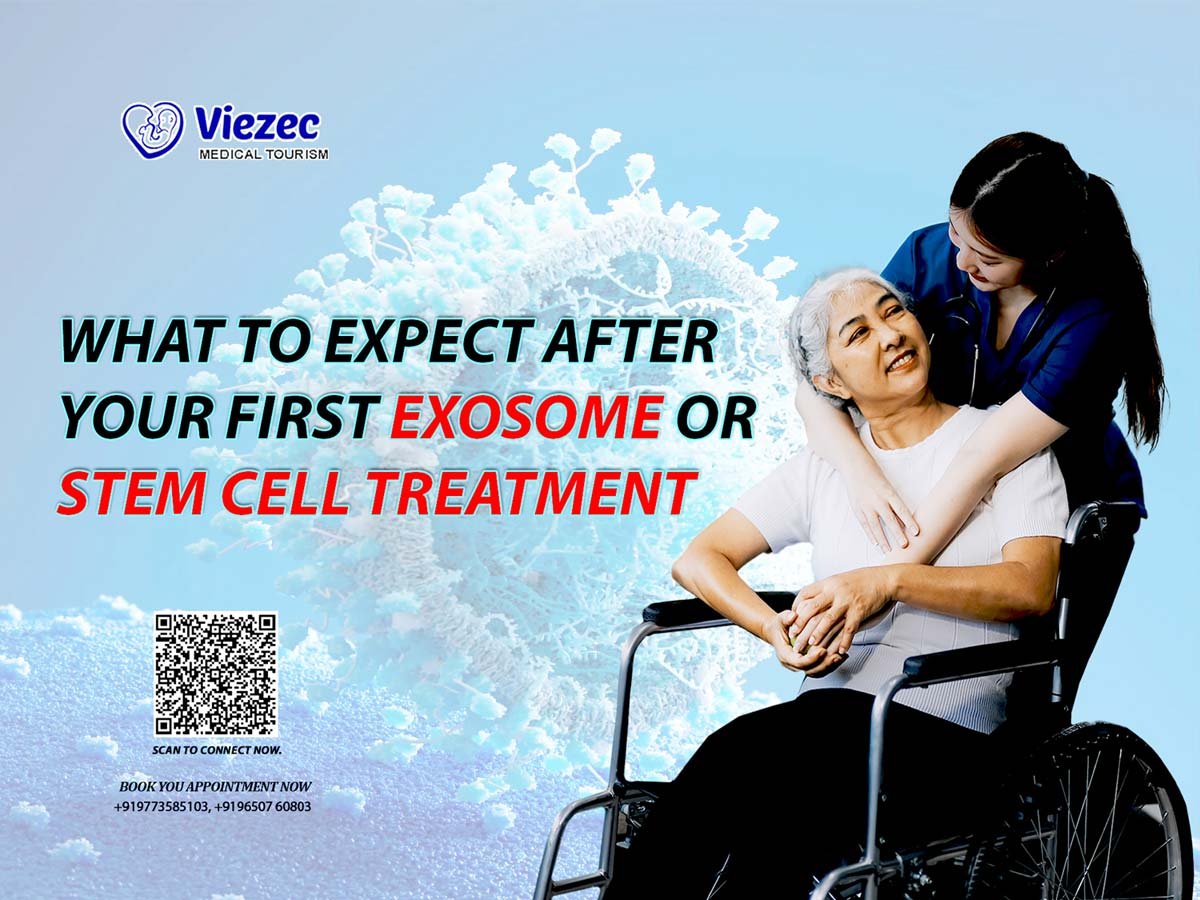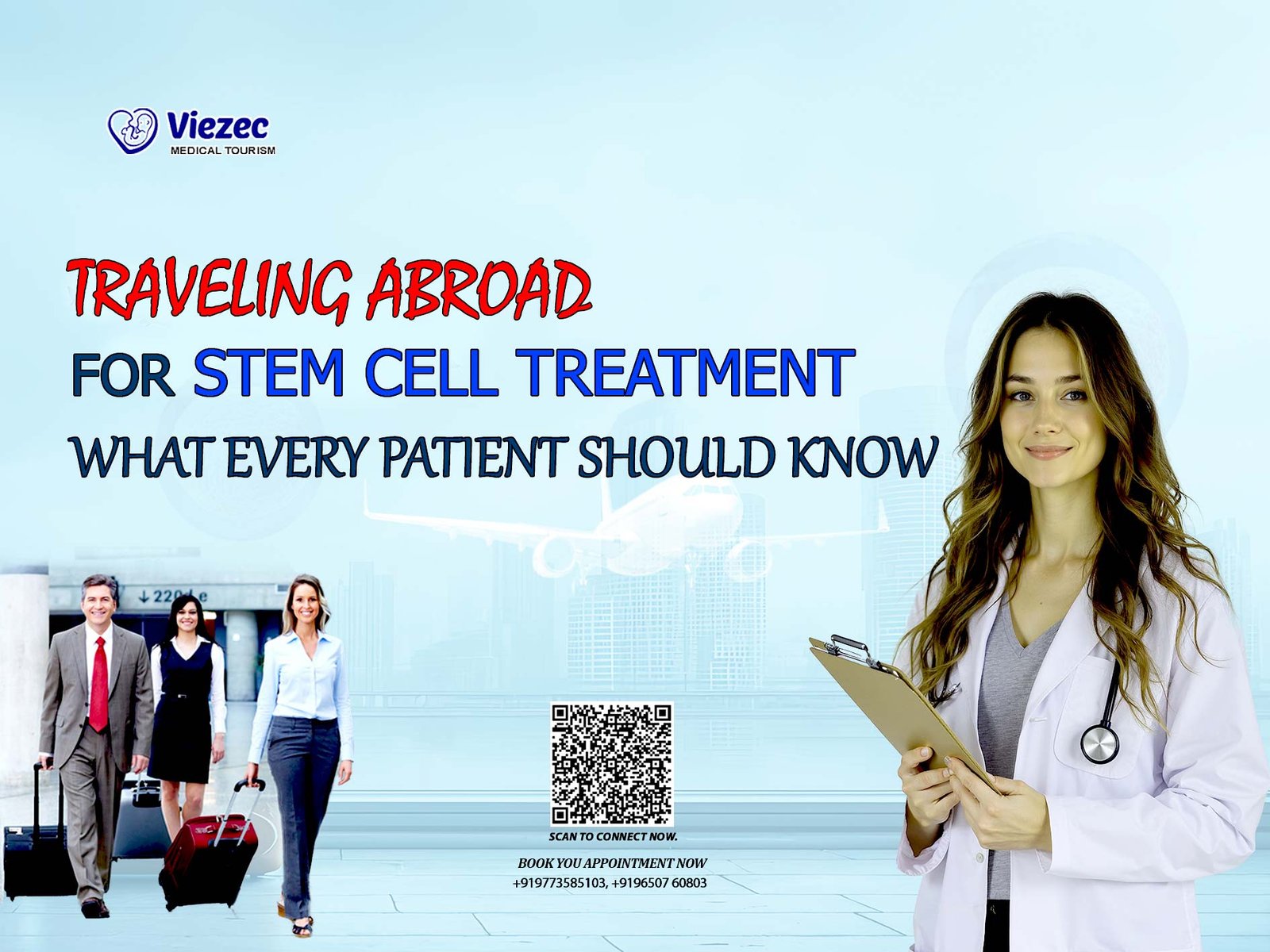
Key Takeaways
- 1. Therapy uses MSCs for autism:
Uses mesenchymal stem cells (from umbilical cord, placenta, or bone marrow) to reduce brain inflammation, balance immune activity, and support neural connections in children with autism. - 2. Treatment success rates vary widely (60%–95%):
Studies report 60%–90% of children show improvements in speech, social interaction, and behavior. Some Indian centers claim up to 90% success in reducing autism severity. - 3. Younger children and combined therapy respond better:
Results improve when stem cell treatment is combined with speech or behavioral (ABA) therapy, especially in younger or less severe cases. - 4. Safety profile is acceptable but long-term data are lacking:
Side effects are usually mild (fever, headache, fatigue). Long-term data and standardized protocols remain limited, so the therapy is still considered experimental. - 5. Cost is significant and insurance coverage is rare:
In India, treatment costs start around USD 8,000. Insurance usually doesn’t cover it since it’s not fully approved by major regulators.
Autism — Overview
Autism spectrum disorder is a neurodevelopmental condition characterised by differences in social communication, behaviour, and sensory processing. Presentations vary widely from person to person across the spectrum.
Interventions typically include behavioural therapies, educational support, and sensory integration strategies. Regenerative and supportive therapies aim to improve neurodevelopmental outcomes by promoting neural support and reducing associated symptoms when appropriate.
At Viezec, we design compassionate, evidence-informed programs that combine regenerative approaches with developmental and behavioural support to help individuals and families achieve better functional outcomes and quality of life.
How Stem Cells Help in Autism
Autism spectrum disorder is a neurodevelopmental condition affecting social interaction, communication, and behavior. Challenges and strengths vary widely across individuals.
Emerging research suggests MSCs may offer immunomodulatory and neurotrophic benefits that help reduce neuroinflammation and support neural connectivity. Stem cell therapy is investigated as an adjunct to behavioral and educational interventions to improve social, communicative, and adaptive functioning.
Causes of Autism Explained
Autism Spectrum Disorder (ASD) is a neurodevelopmental condition characterized by differences in social communication and restricted, repetitive behaviors. Causes are multifactorial and include genetic, environmental, and neurobiological influences that interact during early brain development.
- Genetic contributions: Multiple genetic variants and rare mutations influence brain development and increase ASD risk.
- Early neurodevelopmental differences: Altered connectivity, synaptic function, and brain growth patterns during prenatal and early postnatal periods contribute to ASD features.
- Environmental and perinatal factors: Advanced parental age, prenatal exposures, and complications during pregnancy or birth are associated with higher ASD likelihood.
- Immune and metabolic influences: Maternal immune activation, metabolic conditions, and certain metabolic disorders can affect neurodevelopment.
- Behavioral and learning impacts: Sensory processing differences and atypical learning styles shape how individuals interact with their environment.
- Secondary supports: Early intervention, tailored therapies, and educational support greatly improve developmental outcomes and quality of life.
Early screening and personalized intervention are key to supporting individuals with ASD. At Viezec, our regenerative medicine and developmental teams work together to create supportive, individualized care plans.
Symptoms of Autism
Autism spectrum disorder (ASD) is a neurodevelopmental condition characterized by differences in social communication and restricted or repetitive behaviors. Signs often appear in early childhood and vary widely in severity and presentation.
- ✅ Delayed speech or difficulties with back-and-forth conversation
- ✅ Challenges with social interaction, eye contact, or understanding emotions
- ✅ Repetitive behaviors, strict routines, or intense interests
- ✅ Sensory sensitivities to sounds, lights, touch, or textures
- ✅ Difficulty adapting to change or managing daily transitions
⚠️ Important: If a child shows early social-communication delays, repetitive behaviors, or sensory concerns, consult a pediatrician or developmental specialist for assessment. Early intervention supports development and daily functioning.
Diagnosis of Autism Spectrum Disorder
Diagnosis of Autism Spectrum Disorder (ASD) relies on developmental history and standardized behavioral assessments. At Viezec, our multidisciplinary team evaluates communication, social interaction, and adaptive behaviour to provide an accurate diagnosis and early intervention plan.
Standard Diagnostic Tests & Evaluations Include:
- Developmental & Behavioral Assessment: Structured tools such as ADOS and ADI-R alongside clinical observation.
- Speech & Language Evaluation: Assesses receptive and expressive communication skills.
- Occupational & Sensory Assessment: Evaluates adaptive skills and sensory processing differences.
- Hearing & Medical Screening: Rule out hearing loss and medical contributors to developmental delay.
- Multidisciplinary Team Review: Pediatric neurology, psychology, speech therapy and family guidance for tailored care.
🌱 Clinical Credibility: ASD evaluations at Viezec follow accepted developmental assessment standards to ensure early, evidence-based intervention planning.
Stem Cell Treatment for Autism
How It Works
Stem cell approaches in Autism Spectrum Disorder (ASD) focus on modulating immune imbalance, reducing neuroinflammation, and supporting neural connectivity. Cells may secrete factors that enhance synaptic function and create a more supportive neural environment for behavioral and cognitive therapies to act.
Procedure at Viezec
Viezec provides individualized assessment including developmental, behavioral, and medical evaluation. Cell therapies are prepared in GMP-certified labs and integrated into a broader program of behavioral therapies and supportive care.
- Comprehensive developmental and medical assessment
- Selection and GMP processing of appropriate cell type
- Administration and close monitoring with pediatric/neurology input
- Integration with behavioral therapies, speech, and occupational therapy
- Regular developmental follow-up and outcome measurement
Expected Outcomes
Some families report improvements in social engagement, attention, mood, and adaptive behaviors within 3–12 months. Individual results vary with age, severity, and concurrent therapies.
Disclaimer: Responses vary widely. Stem cell therapy is offered as part of a comprehensive developmental program and does not replace standard behavioral or educational therapies.
Stem Cell Delivery Methods — Autism
In the context of autism spectrum disorder, delivery methods emphasise safety, tolerability, and reproducibility. Frequently used approaches include intravenous infusion for systemic exposure and intrathecal administration when CNS-directed delivery is indicated. Route and protocol are selected per patient after multidisciplinary evaluation.
All cell therapies are manufactured under GMP standards and administered with careful peri-procedural monitoring. Follow-up includes developmental and behavioural assessments performed by specialist teams.
🧩 Delivery Highlights:
- IV infusion for systemic administration with established tolerability
- Intrathecal route considered only after careful specialist review
- GMP processing and rigorous infection-control measures
- Longitudinal developmental monitoring after therapy
Frequently Asked Questions
What is stem cell treatment for autism?
Stem cell treatment for autism involves using regenerative cells to support brain function, enhance neural connectivity, and potentially improve behavioral and cognitive outcomes in individuals with autism spectrum disorder (ASD).
Who is eligible for stem cell therapy for autism?
Children and adults diagnosed with ASD may be considered for treatment, based on severity, age, and overall health, after evaluation by a qualified medical team.
How is the therapy administered?
Stem cells are usually administered intravenously or via targeted injection into specific areas, using minimally invasive procedures under professional supervision.
Is stem cell therapy safe for children with autism?
When performed at certified clinics by experienced specialists, the therapy is generally safe. Mild side effects may include temporary fever, fatigue, or localized inflammation at the injection site.
How soon can improvements be noticed?
Results vary by individual. Some improvements in behavior, communication, or social interaction may be observed within weeks, while more significant changes typically develop over months.
How many treatment sessions are needed?
The number of sessions depends on age, severity, and therapeutic goals. Typically, patients undergo 1–3 sessions, with follow-ups to assess progress and plan additional therapy if needed.
Can stem cell therapy replace conventional autism treatments?
No, it is generally used as a complementary therapy alongside behavioral interventions, occupational therapy, speech therapy, and medications, rather than a standalone treatment.
How can I schedule a consultation for stem cell therapy?
You can schedule a consultation by contacting our clinic via phone, email, or the online appointment form. Our experts will evaluate eligibility and create a personalized treatment plan.
For more questions, visit our FAQs page or request an evaluation with our expert team.
How Much Does Stem Cell Therapy Cost for Autism?
The cost of stem cell therapy for autism depends on various factors such as the child’s age, autism severity level (mild, moderate, or severe), type of stem cells used (mesenchymal, cord-derived, etc.), number of sessions required, and the clinic’s medical expertise. Since healthcare costs and standards differ from country to country, prices can vary widely. Below is a global comparison to help you understand the estimated cost range for autism stem cell therapy.
Cost Comparison: Select Countries
The following table highlights approximate costs reported by international clinics for a full stem cell therapy package — including medical evaluation, stem cell preparation, infusion sessions, and post-treatment follow-up care.
| Country | Average Cost (in USD) | Average Cost (in INR) |
|---|---|---|
| United States 🇺🇸 | $18,000 – $30,000 | ₹14,90,000 – ₹24,80,000 |
| United Kingdom 🇬🇧 | $14,000 – $25,000 | ₹11,60,000 – ₹20,60,000 |
| Germany 🇩🇪 | $16,000 – $27,000 | ₹13,20,000 – ₹22,20,000 |
| India 🇮🇳 | $6,000 – $10,000 | ₹4,90,000 – ₹8,20,000 |
| Thailand 🇹🇭 | $10,000 – $16,000 | ₹8,20,000 – ₹13,10,000 |
While the cost in developed countries like the USA, UK, and Germany is relatively high due to advanced infrastructure and operational expenses, India provides equally competent treatment at a much lower cost. Many international families choose India not only for affordability but also for the availability of modern stem cell labs and internationally trained specialists.
The lower treatment expenses in India come from factors like economical healthcare systems, favorable currency exchange rates, and reduced administrative costs — without compromising on quality. Indian clinics follow global safety protocols and ensure ethical medical practices for autism care using regenerative medicine.
Why Choose Viezec?
Viezec offers personalized assistance to families seeking advanced stem cell therapy for autism. We collaborate with certified hospitals and regenerative medicine experts to deliver safe, result-driven, and affordable treatment experiences with full transparency and compassionate care.
Get a Personalized Cost Estimate
Every child’s condition is unique. Contact our care team to receive a personalized quotation and a customized treatment plan suited to your child’s medical needs.
Improvements & Results
Based on patient follow-ups at Viezec, children and adults with Autism often make significant progress in communication, social skills, and adaptive behaviour with personalized therapies and family-centred support.
Communication Gains
Speech and language interventions increase verbal and non-verbal communication, improving interactions.
Social & Behavioural Skills
Structured social skills training and behaviour support improve daily functioning and reduce distress.
Adaptive Independence
Occupational therapy and routine-building support greater independence in self-care and education/work tasks.
Patient Experiences
“Therapies helped my son speak more clearly and join group activities at school.”
– Parent from Surat, India
“Consistent routines and occupational therapy improved daily living skills and reduced meltdowns.”
– Caregiver from Doha, Qatar
Mechanism of Action: How Stem Cells Support Neurodevelopment in Autism
Stem cell therapy for Autism Spectrum Disorder (ASD) focuses on regulating immune responses, supporting neural connectivity, and improving the brain’s biochemical environment. Stem cells serve as biological modulators that release anti-inflammatory and neurotrophic factors to support overall brain function.
- Immune Regulation: Stem cells help balance immune activity associated with neuroinflammation in ASD.
- Neural Connectivity Support: Neurotrophic factors promote healthier communication between brain cells.
- Inflammation Reduction: They help reduce chronic inflammation that may influence behavioral symptoms.
- Oxidative Stress Reduction: Antioxidant support improves the overall neural environment.
These biological actions highlight the potential role of MSCs in supporting neurodevelopment in ASD. At Viezec, all therapies follow strict clinical and ethical standards to ensure safety throughout the treatment process.
Autism
At Viezec, our autism support programs combine evidence-informed regenerative options with comprehensive behavioral and developmental therapies to support functional gains, communication, and quality of life.
Every plan is individualized and delivered with experienced clinicians and accredited partners to ensure safety, transparency, and ethical care.
Treatment Results
Families and patients exploring stem cell treatments for Autism at Viezec sometimes report supportive improvements such as increased social engagement, reduced behavioral reactivity, better eye contact, and improved participation in therapies. The type and degree of changes vary widely based on individual developmental profile and baseline behavior.
Careful follow-up using behavioral scales, developmental assessments, and therapy progress notes helps evaluate any changes and tailor interventions. While some families observe meaningful behavioral and social gains within 6–12 months, responses are heterogeneous and not all individuals show measurable change.
At Viezec, regenerative options are provided within a research-focused framework. Stem cell therapy is not a guaranteed cure for autism spectrum disorders and outcomes differ by individual. It is important to know that stem cell therapy is an evolving area of study and effects vary among patients.
Testimonials
Aarav K. – Delhi, India – January 2020 – ⭐⭐⭐⭐☆
“My son struggled with eye contact and communication. After Viezec’s stem cell therapy, he became more responsive and interacts better with us.”
Sophia M. – New York, USA – July 2020 – ⭐⭐⭐⭐⭐
“Our daughter started using more words and expressing emotions after therapy. Viezec’s care gave us hope for her continued progress.”
Omar H. – Cairo, Egypt – March 2021 – ⭐⭐⭐⭐☆
“My child had difficulty focusing in school. Post stem cell treatment at Viezec, his concentration improved and he responds more quickly to teachers.”
Emily S. – London, UK – October 2021 – ⭐⭐⭐⭐⭐
“The therapy made a visible difference in my son’s behavior. His hyperactivity reduced, and he engages more calmly in daily activities.”
Fatima N. – Dubai, UAE – February 2022 – ⭐⭐⭐⭐☆
“Our daughter had delayed speech, but after Viezec’s therapy, she began forming simple sentences. It was an incredible change for us.”
Luca R. – Rome, Italy – August 2022 – ⭐⭐⭐⭐⭐
“Viezec’s treatment helped my son improve in social interaction. He now plays with other children, which was very difficult before.”
Hannah G. – Toronto, Canada – April 2023 – ⭐⭐⭐⭐☆
“We noticed better emotional control in our child. He now communicates his needs more clearly and has fewer meltdowns.”
Mohammed A. – Riyadh, Saudi Arabia – September 2023 – ⭐⭐⭐⭐⭐
“After therapy, my son became more affectionate and started responding to his name. The improvement in his social skills is remarkable.”
Chloe W. – Sydney, Australia – January 2024 – ⭐⭐⭐⭐☆
“My daughter’s sensory issues reduced after treatment at Viezec. She tolerates new environments better and feels less anxious.”
Mateo L. – Madrid, Spain – June 2025 – ⭐⭐⭐⭐⭐
“Stem cell therapy brought real progress for our child. His speech improved, and he interacts with peers more confidently than ever before.”
Different Neuro Disorders That Could Benefit From Stem Cell Therapy
Where can I get stem cell therapy for neuropathy?
How could stem cell therapy be used to treat intellectual disabilities?
What are the potential benefits of stem cell therapy for treating amyotrophic lateral sclerosis?
How can stem cell therapy help autistic children?
How Stem Cell Therapy is Helping Patients with Parkinson’s
How Does Stem Cell Therapy Work for Cerebral Palsy Patients?
Where can I get Stem Cell Treatment for Muscular Dystrophy?
Is stem cell therapy a cure for Alzheimer’s disease?
How can stem cell treatment help those with a brain injury?
How could stem cell therapy be used to treat multiple sclerosis?
How does Stem Cell Therapy work for Stroke patients?
What are the potential benefits of stem cell treatment for Spinal Muscular Atrophy?
Ahead of undergoing this process; a patient needs to understands that stem cell therapy is an experimental therapy that might not work at certain times. At the time of procedure, a patient might be refused the treatment or the proposed protocol might change depending on the patient’s health condition.
At Viezec Stem Cell Institute, our main motive is to give the best technology and safety available; of which has been proven across the globe.
As with any medical treatment, there are no guarantees or claims of cures are made as to the extent of the response to treatment. Every patient has different internal status of body; hence results vary from patient to patient, even with a similar diagnosis. This means that we cannot offer, infer or suggest that there is any certainty of a given outcome. For our any treatment we do not use embryonic or fetal cells.
Treatment Results — Autism Spectrum Disorder
Stem-cell approaches for autism are highly experimental. Small uncontrolled series and some clinics report substantial improvements (wide ranges reported), but systematic reviews conclude that evidence is **insufficient and heterogeneous**. Reported positive-response ranges in small series vary widely (often quoted ~20–80% by different clinics), but high-quality randomized data are lacking. Present figures should be interpreted cautiously.
~30–60%
Reported improvement in small series (highly variable)
Evidence: Insufficient
Higher-quality randomized trials are needed
Conclusion
Stem cell therapy for autism offers a new dimension of hope for families seeking meaningful improvement in communication, social interaction, and cognitive development. At Viezec, we combine advanced regenerative technology with a patient-centric approach, ensuring every treatment follows the highest international safety and ethical standards. Our experienced medical team and accredited partner hospitals in India provide comprehensive support throughout the journey — from pre-assessment to post-therapy care. If you or your loved one is exploring innovative treatment options for autism, connect with Viezec today to learn how personalized stem cell therapy can help enhance quality of life and overall well-being.
We Also Offer Treatments For
Our Testimonials
Related Videos
Recent Blog Posts
4.8 average based on 654 reviews.




